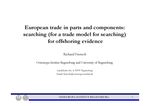European Trade in Parts and Components: Searching (for a Trade Model for Searching) for Offshoring Evidence

Richard Frensch
presented at: European Trade in Parts and Components: Searching (for a Trade Model for Searching) for Offshoring Evidence (17 Jun 2010)
Richard Frensch, Institute for East European Studies Regensburg and University of Regensburg
Recent empirical studies have been searching for evidence on and driving forces for offshoring. Typically, this search has been conducted by analysing gross trade flows related to offshored activities using gravity equations augmented by ad hoc measures of supply-side country differences. This paper suggests that gravity formulations of this sort are potentially mis-specified, due to theoretically unmotivated attempts of allowing for both complete and incomplete specialisation influences on gross trade flows within the same gravity framework. The paper suggests an alternative specification rooted in incomplete specialisation with complete specialisation as a natural limiting case. Re-sults support evidence for offshoring activities across Europe, driven by supply-side country differences compatible with models of incomplete specialisation and trade. Fur-ther interpretation of the results in the spirit of Grossman and Rossi-Hansberg (2008) suggests the conjecture that the latest waves of offshoring activities from 'old' to 'new' EU members may have been more likely to hurt (low-skill) workers in the old EU than offshoring to east Asia.
Recent empirical studies have been searching for evidence on and driving forces for offshoring. Typically, this search has been conducted by analysing gross trade flows related to offshored activities using gravity equations augmented by ad hoc measures of supply-side country differences. This paper suggests that gravity formulations of this sort are potentially mis-specified, due to theoretically unmotivated attempts of allowing for both complete and incomplete specialisation influences on gross trade flows within the same gravity framework. The paper suggests an alternative specification rooted in incomplete specialisation with complete specialisation as a natural limiting case. Re-sults support evidence for offshoring activities across Europe, driven by supply-side country differences compatible with models of incomplete specialisation and trade. Fur-ther interpretation of the results in the spirit of Grossman and Rossi-Hansberg (2008) suggests the conjecture that the latest waves of offshoring activities from 'old' to 'new' EU members may have been more likely to hurt (low-skill) workers in the old EU than offshoring to east Asia.
Keywords: offshoring, gravity
JEL classification: F14, F16, L24
Research Areas: Other